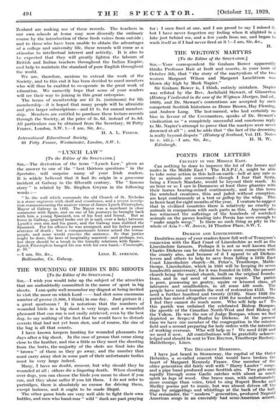"LYNCH LAW "
[To the Editor of the SPECTATOR.] SIR,—The derivation of the term " Lynch Law," given as the answer to one of the " best thirteen questions " in the Spectator, will surprise many of your Irish readers. It is widely believed that it had its origin in a gruesome incident at Galway in the fifteenth century. The " famous story " is related by Mr. Stephen Gwynn in the following words :- " In the wall which surrounds the old Church of St. Nicholas is a stone engraven with skull and crossbones, and a recent inscrip- tion commemorating the austere virtue of James Lynch Fitzstephen, Mayor of Galway in 1493. The Mayor was a merchant in close commerce with Spain, and on one of his journeys he brought back with him a young Spaniard, son of his host and friend. But at home in Galway, quarrel broke out (it is said, over a lady) between Lynch's own son and his guest, and the Galway man stabbed the Spaniard. For his offence he was arraigned, and his father passed sentence of death ; but a compassionate horror seized the towns- people, and none would execute the sentence. So that justice might be done, the laws of hospitality asserted—and perhaps, too, lest there should be a break in the friendly relations with Spain— Lynch Fitzstephen hanged his son with his own hand.—Connaught, p. 35."
Ballinasloe, Co. Galway.








































 Previous page
Previous page